A discovery: brother Charles
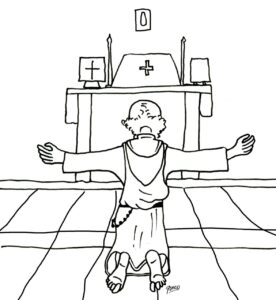 One day we read something about Charles de FOUCAULD. Somehow his way of living the Gospel caught our attention. We discovered how his life testimony was truly surprising. Through the books of René VOILLAUME, Carlo CARRETO, Jean-François SIX, or Arturo PAOLI, a line of spirituality and action opened up before us. It could have been the word or the invitation of a colleague to participate in a prayer retreat, a meeting of other priests, or an article in a publication that spoke of a man in love with Jesus, who changed his life from being rich to being poor; a man with a sense of universal brotherhood and full of God, or some little brothers and little sisters, or priests, who followed a style of being Christians from the simple, work, being with the poor above all, men and women incarnated in the reality of their environment. Perhaps when we were students, we were struck by the fact that, among so much theology, there was a direct way of knowing Jesus, from a man who, without being of our time, was ahead of Vatican II and had intuitions that later became reality, in his life and in the lives of many Christians who see this world as a marvelous work of God, where human beings must live in universal brotherhood. We are diocesan priests and called to be the Church, without sectarian traits or those specially chosen for something glorious: called to be universal brothers as well.
One day we read something about Charles de FOUCAULD. Somehow his way of living the Gospel caught our attention. We discovered how his life testimony was truly surprising. Through the books of René VOILLAUME, Carlo CARRETO, Jean-François SIX, or Arturo PAOLI, a line of spirituality and action opened up before us. It could have been the word or the invitation of a colleague to participate in a prayer retreat, a meeting of other priests, or an article in a publication that spoke of a man in love with Jesus, who changed his life from being rich to being poor; a man with a sense of universal brotherhood and full of God, or some little brothers and little sisters, or priests, who followed a style of being Christians from the simple, work, being with the poor above all, men and women incarnated in the reality of their environment. Perhaps when we were students, we were struck by the fact that, among so much theology, there was a direct way of knowing Jesus, from a man who, without being of our time, was ahead of Vatican II and had intuitions that later became reality, in his life and in the lives of many Christians who see this world as a marvelous work of God, where human beings must live in universal brotherhood. We are diocesan priests and called to be the Church, without sectarian traits or those specially chosen for something glorious: called to be universal brothers as well.
The spirituality of Nazareth
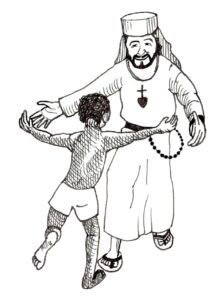 Brother Charles perhaps opened a different path in faith for us; not the only one, but the one to which God calls each of us, just as we are, without the frustration of not being another way, better or more perfect. This does not make us above other forms of spirituality, but rather draws us closer to Jesus where he is, in coexistence with those who are close to us, where we live, with those we meet every day. Nazareth is being with people, not living apart from anyone. Nazareth is working like everyone else, or being sick like another sick person, or being retired like so many retired people. It is smiling with those who laugh and crying with those who cry. Without empathy we cannot understand what Nazareth is and understand what simple events or the small things of every day bring us. Sometimes priests find it difficult to live in that style, or to have a pastoral activity without thinking about success. Clericalism is very far from Nazareth, as Nazareth is far from the temple of Jerusalem… That is why we should not feel like failures if few people attend the parish meetings, or if the temple is mostly elderly or has very few believers. To live in Nazareth is to bring Jesus as a neighbour to the neighbourhood, the town, the street, where people gather, in hospitals, prisons, shelters, to share in the hopes of refugees or displaced persons. This can be difficult to understand if we want to preserve our personal security or possible social privileges.
Brother Charles perhaps opened a different path in faith for us; not the only one, but the one to which God calls each of us, just as we are, without the frustration of not being another way, better or more perfect. This does not make us above other forms of spirituality, but rather draws us closer to Jesus where he is, in coexistence with those who are close to us, where we live, with those we meet every day. Nazareth is being with people, not living apart from anyone. Nazareth is working like everyone else, or being sick like another sick person, or being retired like so many retired people. It is smiling with those who laugh and crying with those who cry. Without empathy we cannot understand what Nazareth is and understand what simple events or the small things of every day bring us. Sometimes priests find it difficult to live in that style, or to have a pastoral activity without thinking about success. Clericalism is very far from Nazareth, as Nazareth is far from the temple of Jerusalem… That is why we should not feel like failures if few people attend the parish meetings, or if the temple is mostly elderly or has very few believers. To live in Nazareth is to bring Jesus as a neighbour to the neighbourhood, the town, the street, where people gather, in hospitals, prisons, shelters, to share in the hopes of refugees or displaced persons. This can be difficult to understand if we want to preserve our personal security or possible social privileges.
The Month of Nazareth helps us, at least once in our lives, to live in fraternity this spirit of Brother Charles, delving deeper into his life and legacy, sharing our lives and realities by praying together, working on something manual – without playing at being workers for a day -, reviewing our lives, joys and failures, giving the desert its time, as a search and encounter with the silence of God, doing together the tasks of any home, even if in this case it is a home for singles. In the Month of Nazareth we make our commitment to fraternity, which is a commitment to live the gospel and follow Jesus, wherever he puts us.
A delivery to the poorest
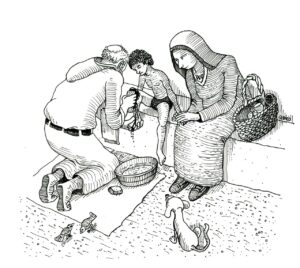 Breaking the mold of family and social tradition, Charles de FOUCAULD, after his search for God, chose to be poor like Jesus. When one falls in love, one wants to listen to the other person’s heart. Brother Charles identified himself with his Beloved Jesus by going to the most abandoned.
Breaking the mold of family and social tradition, Charles de FOUCAULD, after his search for God, chose to be poor like Jesus. When one falls in love, one wants to listen to the other person’s heart. Brother Charles identified himself with his Beloved Jesus by going to the most abandoned.
Florencio ROSELLÓ, archbishop of Pamplona, Spain, says on the World Day of the Poor 2024: “On this Day of the Poor, a doubt always arises in me: when we talk about the poor, who do we think of? Sometimes I see that they are people dependent on my “alms”, people dependent on my attitude, people who are below me, who look up to me, and I look down on them. I feel superior to them, and that bothers me. I have always wanted to treat the poor as equals, to look them in the eye, because I am at the same level as them, not from top to bottom, as if I were the good one and he…think what you want.” Our Pope Francis always insists on this, and, even more, we must touch the poor, shake their hand, or hug them, so that we do not feel disgusted, nor think that we are going to get dirty.
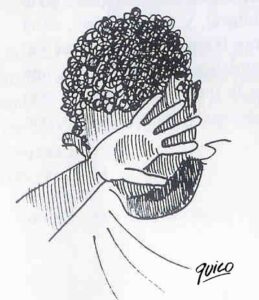 Charles de Foucauld went further: we must be with them, live with them, according to their style, without distinguishing ourselves by our religious status, which is sometimes classist and clerical, even if we are middle class. The poor do not understand university degrees: they understand those who are like them, and they approach them without fear or prejudice. There are many forms of poverty around us, and not only material poverty: poor people who do not have a free heart, poor people who lack friendship, poor people saturated with technology and lacking humanity… We often live among them, and we do not have to go very far. Poor countries with external debt – and eternal – with the West, immigrants in poor conditions: all those rejected by wealth. How can we be coherent in our lifestyle with a world full of injustice? Fraternity also makes us see the poverty of our own miseries.
Charles de Foucauld went further: we must be with them, live with them, according to their style, without distinguishing ourselves by our religious status, which is sometimes classist and clerical, even if we are middle class. The poor do not understand university degrees: they understand those who are like them, and they approach them without fear or prejudice. There are many forms of poverty around us, and not only material poverty: poor people who do not have a free heart, poor people who lack friendship, poor people saturated with technology and lacking humanity… We often live among them, and we do not have to go very far. Poor countries with external debt – and eternal – with the West, immigrants in poor conditions: all those rejected by wealth. How can we be coherent in our lifestyle with a world full of injustice? Fraternity also makes us see the poverty of our own miseries.
Sharing faith and life
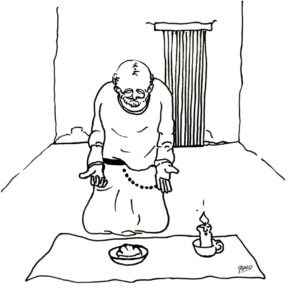 The life of a priestly fraternity Iesus Caritas is the life of men of faith who follow Jesus and help each other to be faithful to the Gospel. In the monthly meeting – in the local fraternity -, in the annual or quarterly retreat, in the assemblies, and in everyday life, wherever one is, this encounter with Jesus is renewed in adoration, in the time of silence and contemplation of the Eucharist, without rushing. Jesus, who looks at us and welcomes us. Jesus, who listens to us and shares our silence and our noises. In order to have friendship with Jesus, we have to draw close to him. Brother Charles and the great orators throughout history bear witness to this profound friendship with God.
The life of a priestly fraternity Iesus Caritas is the life of men of faith who follow Jesus and help each other to be faithful to the Gospel. In the monthly meeting – in the local fraternity -, in the annual or quarterly retreat, in the assemblies, and in everyday life, wherever one is, this encounter with Jesus is renewed in adoration, in the time of silence and contemplation of the Eucharist, without rushing. Jesus, who looks at us and welcomes us. Jesus, who listens to us and shares our silence and our noises. In order to have friendship with Jesus, we have to draw close to him. Brother Charles and the great orators throughout history bear witness to this profound friendship with God.
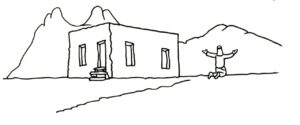 And in the desert, another prolonged period of listening, friendship is strengthened, as is love for the person we miss because he is not at our side. We do not see God, but we feel him, because he is looking for us.
And in the desert, another prolonged period of listening, friendship is strengthened, as is love for the person we miss because he is not at our side. We do not see God, but we feel him, because he is looking for us.
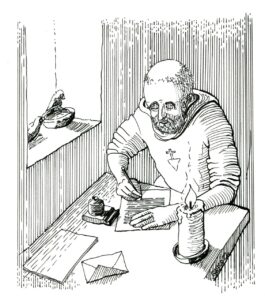 We may be afraid of solitude, or of finding ourselves, our vulnerable reality. In the Prayer of Abandonment we say “with infinite confidence”… When there is confidence, fears go away. For the desert we need practically nothing: only ourselves. We do not need a temple or a chapel, nor books, nor a Bible, nor a pleasant or comfortable landscape: we must go out to where God leads us. Silence…
We may be afraid of solitude, or of finding ourselves, our vulnerable reality. In the Prayer of Abandonment we say “with infinite confidence”… When there is confidence, fears go away. For the desert we need practically nothing: only ourselves. We do not need a temple or a chapel, nor books, nor a Bible, nor a pleasant or comfortable landscape: we must go out to where God leads us. Silence…
Fraternity life is sharing life as it is, in every encounter, especially in the review of life. Charles de FOUCAULD did not review his life because he did not have a fraternity of Christians like him. Deepening his friendship with the people with whom he lived, encouraged by the spiritual direction of Father Henry HUVELIN, from a distance between France and Algeria, and before in his various stages of search, Brother Charles had a permanent review of life, in prayer, in his letters, which led him not to be comfortable and settled in pre-made plans: he was always open to the reality of life and circumstances. In fraternity we live the review of life as a means of inner growth, listening and being listened to. Mutual trust is necessary, the acceptance of others, with their way of being, sometimes with different ideas about the Church and society. 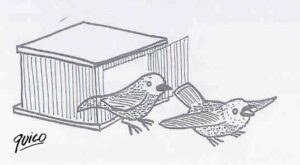 Dialogue, meeting in a climate of prayer, remove prejudices and judgments towards others. For this reason, for a true review of life, transparency of the interior of each person is essential. We must not review pastoral activities, we must review ourselves. Others will help us. And, above all, we must feel free, without closed doors.
Dialogue, meeting in a climate of prayer, remove prejudices and judgments towards others. For this reason, for a true review of life, transparency of the interior of each person is essential. We must not review pastoral activities, we must review ourselves. Others will help us. And, above all, we must feel free, without closed doors.
In Jesus’ project
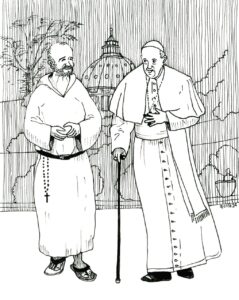 The Iesus Caritas priestly fraternity is a small part of the whole of the Church of Jesus, one more piece of the whole for which Jesus lived: sheep responsible for other sheep who do not look down from power. We feel in communion with Pope Francis, who always has Saint Charles de FOUCAULD present in his encyclicals, and we want to be a Church that goes out, in the peripheries, to continue discovering Jesus and working for his Kingdom, in need of others and at the service of those who are not successful protagonists. Evangelizing by being contemplative and allowing ourselves to be evangelized.
The Iesus Caritas priestly fraternity is a small part of the whole of the Church of Jesus, one more piece of the whole for which Jesus lived: sheep responsible for other sheep who do not look down from power. We feel in communion with Pope Francis, who always has Saint Charles de FOUCAULD present in his encyclicals, and we want to be a Church that goes out, in the peripheries, to continue discovering Jesus and working for his Kingdom, in need of others and at the service of those who are not successful protagonists. Evangelizing by being contemplative and allowing ourselves to be evangelized.
Aurelio SANZ BAEZA,
fraternity of Murcia, Spain
(Thanks, Quico, for the drawings)
📑 Download the document in PDF: Priestly Fraternity Iesus Caritas. Aurelio SANZ BAEZA – en


